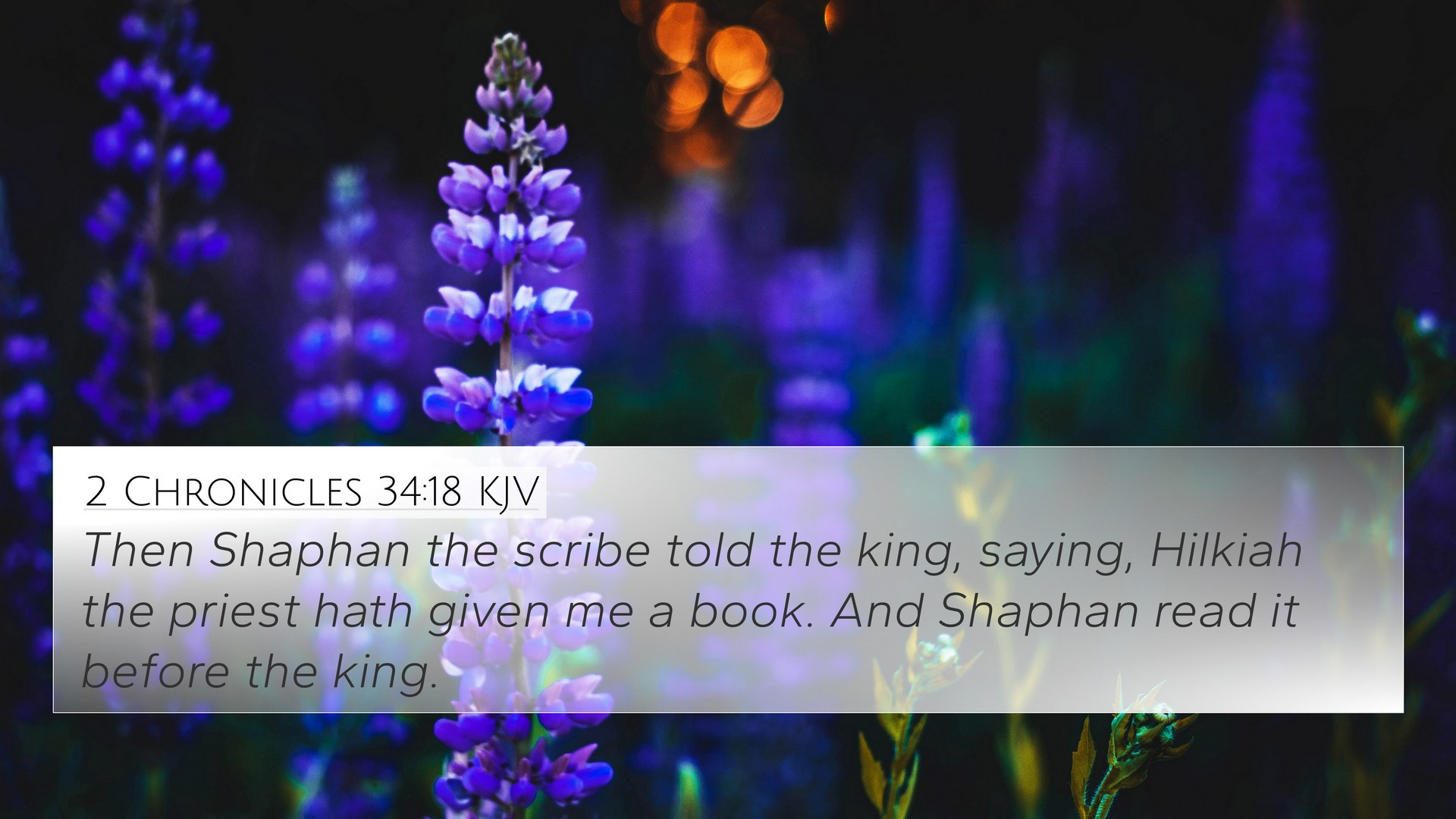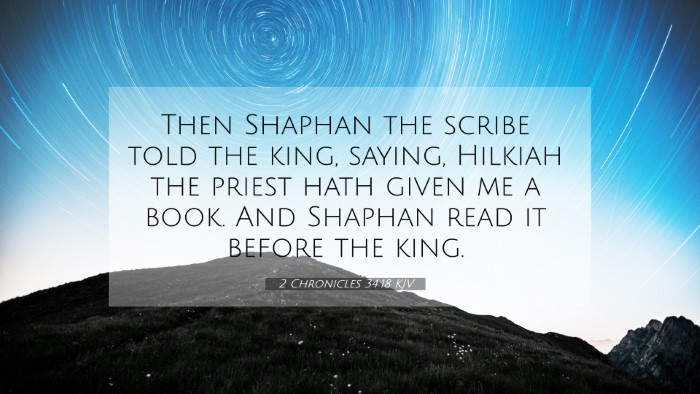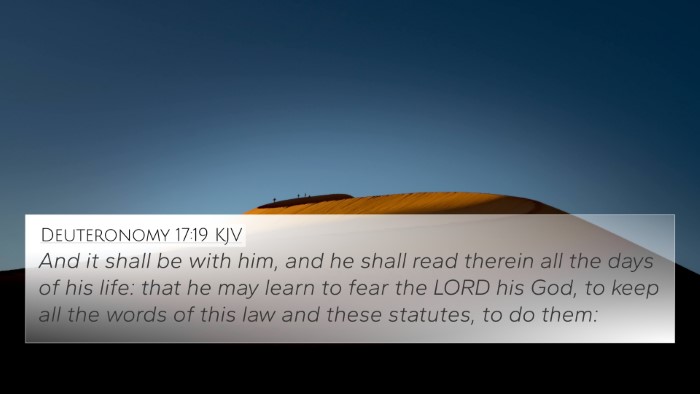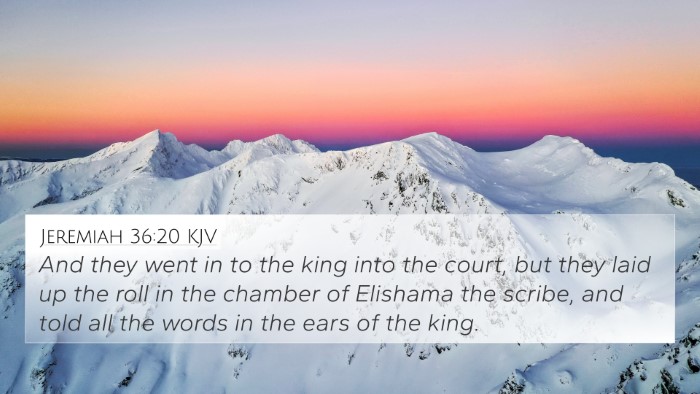Understanding 2 Chronicles 34:18
2 Chronicles 34:18 reads: "But Shaphan the scribe told the king, saying, 'Hilkiah the priest has given me a book.' And Shaphan read it before the king." This verse marks a significant moment in the history of Judah as it indicates the discovery of the Book of the Law during king Josiah's reign. This moment catalyzed a religious reform that would bring the nation back to the ways of the Lord.
Key Themes and Insights
- The Role of Scripture: The discovery of God's Word was pivotal in Josiah's reign. Matthew Henry emphasizes the importance of returning to Scripture for guidance and reform.
- Leadership and Responsibility: The actions of Shaphan and Josiah reflect the responsibilities leaders have toward God’s Word. Adam Clarke notes that true leadership involves acknowledging and adhering to Scriptural guidance.
- Revival of Faith: Hilkiah's finding of the law book is seen as a divine act facilitating revival. Albert Barnes explains that this led to the greater understanding and rectification of Judah's spiritual state.
- Covenant Renewal: This discovery symbolizes an opportunity for covenant renewal. Hilkiah's role in finding the book represents the theme of restoration found throughout the historical books of the Bible.
- The Impact of the Written Word: The reading of the book signifies not only the physical discovery but the spiritual awakening that follows, as emphasized in various commentaries, including Adam Clarke’s analysis.
Cross References
This verse connects with several other passages that enhance understanding and thematic connections:
- 2 Kings 22:8-11: A parallel account of the finding of the Book of the Law and its immediate impact on Josiah.
- Deuteronomy 17:18-20: Instructions for kings about their relationship with the Law, highlighting the importance of reading and following it.
- 2 Chronicles 33:12-13: A contrasting royal reform linked through the repentance of Manasseh, showcasing the necessity of God's guidance.
- Ezra 7:10: The commitment to study, practice, and teach the Scriptures, similar to the actions prompted by Shaphan and Josiah.
- Nehemiah 8:1-3: The restoration of the reading of the Word during Ezra's leadership, echoing the significance of Scripture in community revival.
- Psalms 119:105: “Your word is a lamp to my feet and a light to my path,” reflecting the importance of Scriptures as guidance.
- Isaiah 34:16: The call to seek out the Book of the Lord, underlining the value placed on divine revelation.
Importance of Cross-Referencing
In studying the Bible, understanding cross-references is crucial as they reveal the interconnectedness of Scripture. This method not only aids in understanding specific passages but invites deeper insight into the overarching narrative of faith and divine intervention.
Tools for Cross-Referencing
- Utilizing a Bible concordance can help locate verses related to 2 Chronicles 34:18 effectively.
- A cross-reference Bible study guide will provide contextual frameworks for examining related themes.
- Investing in comprehensive Bible cross-reference materials can deepen understanding through thematic links.
Understanding Connections Between Verses
The exploration of Bible verse cross-references illuminates how Scripture interweaves themes of leadership, the importance of the law, faith renewal, and communal worship. Each verse serves as a piece in the grand tapestry of Biblical narrative.
Conclusion
In conclusion, 2 Chronicles 34:18 carries profound weight in the history of Judah, emphasizing the significance of God's written Word in leadership and spiritual revival. Its connections to various scriptures invite further exploration and reflection, encouraging believers to engage deeply with the Bible as a living document of faith.
FAQ: Finding Cross-References
- How to find cross-references in the Bible? Utilize Bible concordances or digital tools that list related scriptures.
- What verses are related to 2 Chronicles 34:18? See the listed cross-references above, especially the accounts in 2 Kings.
- How do two specific Bible verses connect? Study thematic elements, keywords, and context to find similarities in purpose and meaning.







